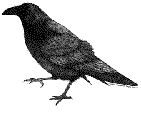One Crow Sorrow
Two Crows Joy
Three Crows a Wedding
Four Crows a Boy
Five crows Silver
Six Crows Gold
Seven Crows a Secret
Never to be told.

Crows have in many cultures, been a bird used in divination, ritual, art and storytelling. They are also the totem animal for people born in the sign of Libra. The crow was regarded in many periods as a messenger of death or harbinger of misfortune; a number are said to have flown around Cicero's head on the day he was murdered and crows were said to possess magical powers. This may have something to do with the crow's cry of 'cras' - the Latin word for 'tomorrow'.
The crow, as "Brewer's Dictionary of Phrase and Fable" puts it, 'symbolizes contention, discord and strife'. The ravens, of the crow family, owe part of their sinister reputation to their odious habit of picking out the eyes of corpses - as the wicked are warned in Proverbs. It's colour, black, invested the raven with ideas of darkness, oblivion and death.
In ancient Greece the raven was an attendant of Apollo. The Norse people believed that their god Odin possessed two ravens, which flew around all day collecting information. In the evening they would perch upon his shoulders, giving him the latest news they had gathered - a highly economical form of secret service.
In both the Old and New Testaments the raven figures frequently, and in Christian history. The ravens fed Elijah, and St. Benedict is often depicted with a raven at his feet. It was a raven that brought St. Paul the Hermit a loaf of bread.
The keeping of ravens at the Tower of London is a strange tradition, for it is assumed that bad luck will result if they leave the place. Yet the building itself has so sinister a history that, far from relieving the all pervading gloom of the place, some think that the presence of the ravens heightens it.
A more genial legend persists in the Welsh superstition that if a blind person is kind to a raven his sight will be restored. In Cornwall the superstition persists that the soul of king Arthur took the form of a raven for which reason one of the species could never be shot. In Brazil a similar belief exists - it is held that the human soul can inhabit the body of a raven.
Another pleasant superstition is that crows can bring you good luck. If you see one flying, your wish will come true as long as the crow does not flap its wings before going out of sight. If it should, the wish might still be granted if your cover your eyes. If the bird is no where in sight when you uncover them, you'll get your wish.
One curious feature of the behaviour of crows is their seeming capacity to hold 'courts' at which, by numerous accounts, they pass judgement and carry out summary execution of such of their numbers as, for some mysterious reason, they consider deserving of it. As Edward Stanley, the Victorian naturalist put it: In the Northern part of Scotland, and in the Faroe Islands, extraordinary meetings of crows are known to occur. They collect in great numbers, as if they had all been summoned, for the occasion; a few of the flock sit with dropping heads, and the others seem as grave as judges, while others again are exceedingly active and noisy; in the course of about an hour they disperse and it is not uncommon, after they have flown away, to find one or two left dead on the spot. Another writer (in Dr Edmonston's "Shetland Isles"), says that these meetings will sometimes continue for a day or two, before the object, whatever it may be, is complete. Crows continue to arrive from all quarters during the session. As soon as they have all arrived, a very general noise ensues, and shortly after, the whole fall upon one or two individuals, and put them to death; when this execution has been performed, they quietly disperse.

No comments:
Post a Comment